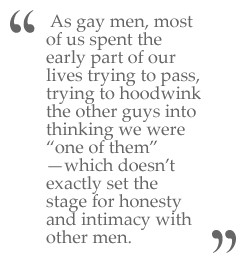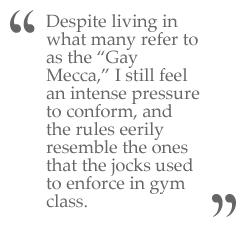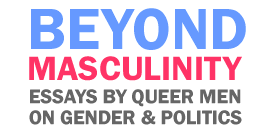 The judgments we grew up with, as deeply rooted in our
psyches as they are, impinge upon our relationships in
ways that are far more pernicious than the judgments we
encounter in our adult lives. As gay men, most of us
spent the early part of our lives trying to pass, trying
to hoodwink the other guys into thinking we were “one of
them” —which doesn’t exactly set the stage for honesty
and intimacy with other men. And although most agree
that things are changing for the better, many of us are
still growing up in what feels like a pretty hostile
world —one in which our brand of loving is hated, where
our desires are viewed as disgusting, reprehensible,
weak-willed, evil, or, at the very least, laughable. The judgments we grew up with, as deeply rooted in our
psyches as they are, impinge upon our relationships in
ways that are far more pernicious than the judgments we
encounter in our adult lives. As gay men, most of us
spent the early part of our lives trying to pass, trying
to hoodwink the other guys into thinking we were “one of
them” —which doesn’t exactly set the stage for honesty
and intimacy with other men. And although most agree
that things are changing for the better, many of us are
still growing up in what feels like a pretty hostile
world —one in which our brand of loving is hated, where
our desires are viewed as disgusting, reprehensible,
weak-willed, evil, or, at the very least, laughable.
Is it surprising then, given this hostility, that many
of us would be just a wee bit emotionally bruised? For
some, continuing to pass is the strategy. For others,
when passing isn’t enough, the goal becomes disappearing
altogether; higher levels of depression, substance
abuse, and suicide in the gay community seem to bear
this out. As long as we consider our uniqueness a
liability, we’ll continue to try to extinguish what’s
aberrant about us. Isolation and drugs remove us from
reality, but only temporarily. When the pain returns,
we’re forced to either embrace our uniqueness or else
extinguish our very being.
This is the shadow, this is the dark current that runs
parallel to gay pride parades and increased gay
visibility. No matter how accepting some families may
be, no matter how many episodes of Will & Grace
get syndicated or how many people put Brokeback
Mountain on their Netflix queues, coming out in
America is still an act of sacrifice and risk and hope
for just about anyone who does it. You’re sacrificing
your assumed role in your family and society. You’re
risking rejection, even abuse, from those who are
supposed to love and care for you the most. You’re
hoping you won’t feel like you’re the only one “like
you” anymore—you’re hoping to trade passing for an
actual sense of belonging.
And certainly, on the surface, San Francisco does
provide a place where I don’t feel so alone anymore. I
can step on any bus in the city, for instance, and know
that there will be other out gays and lesbians heading
to work and generally going about their lives, just like
I do. But if I scratch that shiny iridescent veneer even
just a little, I start feeling as isolated as I did
growing up in the suburbs of San Leandro, where
homophobes were legion. Just south of Oakland, and only
10 miles as the crow flies across the bay from San
Francisco, it was nevertheless light years away
culturally and politically. If anything, its
geographical proximity to San Francisco made its
inhabitants, including its children, more virulent in
their hatred of gays, eager to distinguish themselves
from the perverts who were parading and making waves on
that side of the bay. The close proximity to San
Francisco also made them hyperaware of gay cues—so that
seventh graders with lisps were suspect, and words like
“faggot” and “dyke,” rather than serving their
traditional purpose as generic reminders to toe the
gender-role line, had a more specific meaning: they were
bold-faced accusations, official charges of wrongdoing.
Having grown up in the Bay Area, I’ve witnessed many men
metamorphose over time. Now 32 and having been “out” for
half of my life, I often run into the skinny, soft boys
I knew from queer youth groups in Hayward, Berkeley and
Oakland, newly transformed into hulking Adonises. I even
occasionally see some of them at the gym, where I seem
to be spending as much time as they do. Well out of our
teens now, we’ve abandoned our dreams of turning
heterosexist norms on their heads and embracing our
deviance. After years of trying to be “real men” in
order to be accepted by heterosexuals, we gave up and
ran for the hills of San Francisco. There, we learned
the same lessons over again that were drummed into our
skulls as kids: If you want to make in the world, kid,
you’d better turn that swish into a swagger.
 Despite living in what many refer to as the “Gay Mecca,”
I still feel an intense pressure to conform, and the
rules eerily resemble the ones that the jocks used to
enforce in gym class. Don’t move your hands too much
when you talk. Don’t lisp. Don’t smile or make eye
contact with other boys (well, with one new proviso:
only if you want to fuck them). And don’t let anyone
accuse you of being a 90-pound weakling. Get big, big,
big. Size matters. Despite living in what many refer to as the “Gay Mecca,”
I still feel an intense pressure to conform, and the
rules eerily resemble the ones that the jocks used to
enforce in gym class. Don’t move your hands too much
when you talk. Don’t lisp. Don’t smile or make eye
contact with other boys (well, with one new proviso:
only if you want to fuck them). And don’t let anyone
accuse you of being a 90-pound weakling. Get big, big,
big. Size matters.
The Castro is full of men who are on their way to or
returning from the gym. A lot of these guys would get
winded just from walking to their mailbox, but you
wouldn’t know it by looking at them. They’ve made a
career out of pumping iron (sometimes literally—you
wouldn’t believe how many personal trainers I know), all
in the ironic effort to emulate the thugs who pantsed
them in the schoolyard.
Don’t get me wrong —I’m certainly not immune. I
understand the desire to be considered attractive and
healthy, but there’s something frightening about a
community of men who are bulking up their bodies to
achieve some predetermined definition of masculine
perfection, meanwhile neglecting the fragile psyches
that drove them here in the first place. When I visit
the Castro, I see a lot of hurt little boys hiding
inside the suits of armor they’ve created. As gay men, I
think it’s time we ask ourselves: What is the armor for?
What, or whom, are we protecting ourselves from? From
gay-bashers? Doubtful. If Stonewall taught us nothing
else, it taught us that an artfully thrown beer bottle
is far more effective at deterring physical assault than
a high-definition six-pack. No, we’re protecting
ourselves from one another—that is, we’re protecting
ourselves from being rejected by other gay men... (continue reading)
|




11 COMMENTS ON THIS ESSAY:
If I had 1% more estrogen in my body, I would have probably cried my eyes out when I finished reading this. It was phenomenal! Thank you so much.
Brent Calderwood's essay reminded me of my Italian conversation class. My instructor had a bad habit of constantly interupting me to correct my Italian but when it came time to decribe my ideal mate I corrected my teacher: "Non e' "lei', e' "lui"!" (Translation: It's not "she", it's "he"!) After that my intructor had to constantly prove how liberal and pro-gay she was, the cute Chilean class mate changed his mind about going to the movies with me and most of the other students were cool. It was a great way to come out in another language. Back to Brent's main point, it was a sad day when I realized there is as much pressure to conforn inside the gblti community as outside in the larger world. Joe
A great essay for sure, although I am not sure I completely agree: being gay does not necessarily mean you have to be swishy and skinny. I am sure some people are uber-queers hiding in muscle/macho bodies for fear of rejection, but there are some of us who just like how we look when ripped and who do like cars, sports, home renovations, sitting on the sofa drinking beer, burping and scratching ourselves, etc... I've even been accused of "trying to act to macho and I wasn't pulling it off", but the truth is, this is the way I act and who I am.
I agree with you Nicolas, the idea that being gay is pure formula, kind of suggests, to me, that being gay is a commercial pursuit.
That's why i consider myself to be queer, and never gay.
Gay has been rendered into retreat, and if you don't behave a certain way, fellow gays will assume you are scared, or closeted.
There is a constant fight, and it isn't just with the hetero standard but it exists amongst ourselves.
“You’re not supposed to use the masculine form of the possessive. You should say, ‘Her eyes, her hair.’”
This reminded me of when i said Loca instead of loco, my teacher scolded me, but i explained that the masculine and feminine are traits of the past and that soon they will be left behind.
Nice essay
It really is a sad tale!
You burst my bubble about SF.
Guess I'm a bit of an idealist myself.
Anyway, you've made an interesting point here.
Tnx :)
Have you ever been to the town of Sitges, Spain? (Near Barcelona). It is full of super-pumped gays with the biggest muscles I've ever seen. When you walk into Sitges as a tourist all you see is the same type of gay men. No families, no old people, no women (except the tiny lesbian minority). It was very bizarre to me at first because where I grew up (Coventry, UK) the gay scene looked the complete opposite: skinny jeans on painfully skinny boys, indie shirts and emo haircuts.
Nocolas--
I don't think he was saying that gay men are supposed to be effeminate; I think he was saying that many of those who happen to be effeminate are forced to hide it, which is dishonest and sycophantic. So I don't think there is any need for masculine gay men to be upset by his premiss.
And we all know how many "straight-acting" fellows there are out there. They even claim, literally, to "act" straight (since that's what a "real" man acts like, apparently, except that they still have sex with men, funnily). Yet, for some reason, we never point out their dissemblance--only that of the gays who pretend to be flamboyant queens.
Talk about a double-standard.
Excellent essay. It made me tear up a little.
Actually I think that the epithet-spewing cowards hiding in a fast car are proof that we're winning. It takes a long time to change the world.
Gay men bring all kinds of hate and insecurity with them into adulthood; we play out the bitchiness and throw shade because it's what we were taught in junior high. I'm hopeful this, too, will diminish as the younger generations have better and better role models to emulate.
Patience. We're winning.
Why can't people just be who they are?
We are born alone and we die alone. Everywhere in between we try to fit in by finding other people who share our values and interests. People always gravitate toward others with whom they have something in common. Who can really say that the people you observe in the Castro are "hiding inside the suits of armor they’ve created" or, are just being themselves? Do "before and after" pix exist?
Who exactly is protecting themself from being rejected by other gay men?
I think it is easy to generalize when looking from the outside into any of the many gay sub-cultures. Although I have no doubt that self-hatred is and probably always will be a fact of life for many people due to what is perceived as non-acceptance (whether it be gender, race, sexual preference, age, etc.), it is still up to each individual to find for themself where that place is that they will no longer feel fear. It is the responsibility of the rest of us to allow them their journey along the path of life and perhaps even make a friend or 2 along the way. What really makes all of us strong (therefore taking away all fear) is respect for all the diversity among our people.
Yes, look each other in the eye and see ourselves in one another.
Brent, your essay makes some very important points about acceptance (not tolerance) and how much further American society has to go to achieve that goal. I really appreciated that your essay made that point explicitly and clearly.
Your opening vignette about your friend and his French teacher, however, unfortunately, is not quite right. In the French language, possessive pronouns (my,his, hers theirs...) are NOT related to the subject (your friend in your example), but the object of possession. That is to say, whether you are a man or a woman, you use the same adjectives to designate hair, eyes (both of which are plural in the French). So, the teacher was absolutely right in correcting your friend -- it is not the masculine singular (son -- his eyes), but the plural (ses yeux, ses cheveux -- eyes and hair both in the plural in French). This is not just a nit picky grammar point. There is NO way you can give away the gender of the person you are describing if you do not explicitly state his/her gender. Anne Gareta (if you read French) has written an entire novel (Sphinx, 1986) about the love between two people in which the reader never finds out the gender of the main characters, a task that would have been impossible in English.
Having said all this, I appreciate the point you try to make -- people can be so heteronormative, that they refuse to acknowledge the possibility that same sex relations could and do exist.
Brent,
I wonder how much of this bulking and gym behavior have something to do with AIDS as much as with Masculinity.
I remember the days of wastings, of KS and of trying all kinds of things to "feel better".
I think we have also gone overboard on the gym as a way to in some way reclaim our bodies, or make it so folks don't see us as "sick".
Or maybe a bit of both.